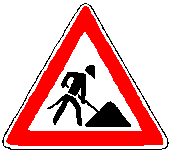This site is under constuction, and there's still a ton to revise on this page alone.

This planning method concentrates on lists, not itineraries. Using this method, you can pick what you feel like doing that day, and have time to stop for things you discover along the way.
Before you plan, sit down and make a list with your companions of what you like and don't like.
Scenery
Trying new food
History museums
Weird roadside attractions
Statues
Parks
Being carried around on hikes
Theme parks
Experience/celebrity restaurants
Military history
Generic tourist traps
The Number One Rule of Traveling: Always choose to do things you can't do at home. Even if it's bad, it's still a unique experience.
What's the one place you really want to go to that's the furthest away from your home? Once you pick this point, you can use it as the end of your loop, and plan from there.
To get the most out of your trip, you don't want to drive on the same roads twice. If your route runs mostly north and south, pick places to the east and west. If it runs mostly east and west, pick places to the north and south of the fastest route.
What places can you visit along the way? These are our first go-to sites when I plan a trip:
Hotels are going to be a major part of your expenses, if not the most expensive part of your trip. Doing some planning ahead of time can keep you from ending up in places where you have to spend hundreds of dollars on a basic room. We never book ahead of time, so we can keep a flexible schedule. However, having a list of decent, affordable hotels on hand makes it easy to pick a place to stay each night. Here are a few things to keep in mind:
What about AirBnB? To be honest, we've never been in a place where this is an affordable option. Unless you're staying in a place for a while, and the location or access to a kitchen gives you an advantages, it's generally not worth it.
Part of the fun of trips is getting to try new foods. You can find information about restaurants on sites like Yelp and Google Maps, as well as local groups.
As a general rule, Local restaurant > Regional chain > National chain
Unusual and less fashionable ethnic restaurants outside of cities are almost always very authentic, very inexpensive, and very good.
Fast food is fun, too. Don't feel like you have to find the most exotic restaurant for each stop. These offer plenty of opportunities for unique dining, whether you're getting a gas station sub on the East coast, or a burger at a mom and pop stand in the middle of nowhere.
Is the city you're going to famous for a specific food? It's probably great there, but not at the place famous for it. There will always be places that are better and cheaper that have shorter wait times. Local groups are a great way to find out about the best non-touristy spots.
If you see signs inside about a Food Network celebrity, and it's not Guy Fieri, LEAVE IMMEDIATELY. There is no surer sign that a place has terrible food.
Road trips are both easier and harder on your car than regular driving. On one hand, everything stays warm, and runs at a steady speed. On the other hand, you're putting a lot of miles on your car over a short period of time.
No one cares what you look like, and you won't be around anyone you know. Always dress for comfort, and cut down on the makeup and styling tools. You will probably eat less healthy than usual. Salt retension can really make tight-fitting clothing uncomfortable.
Even if it's cold out, it's nice to have a pair of sandals to wear in the car to let your feet air out.
Dress in layers. Temperatures can vary drastically as you move between different climates, especially in the mountains. Also, while it may be hot or cold outside, the inside of your car will be comfortable.
You aren't going to do everything on your lists. You'll be in places at the wrong times, you'll have to choose between activities, or you just won't be in the mood. When you're near the end of your trip, you'll probably want to skip a few things, so you can get home sooner.
You're also going to encounter new things along the way, no matter how thoroughly you plan. That's part of the fun.
Think about what's going to make you happy, and spend accordingly.
How do you visit all these places? You must travel for months every year!
We take two weeks vacation every year, and we get a long weekend trip in now and then. We're just good at being efficient at traveling.
Q; How far can I drive in a day?
A: In ideal weather conditions and on high speed highways, about 700 miles. Once you make stops for food and gas, this will be a 13-14 hour day. This isn't something you will want to do on consecutive days. Add road construction and bad weather, and your travel distance will go way down. Even if conditions are good, some people just don't want to drive or be in a car that long. Plan accordingly.
Please, don't drive overnight, or start your trip super early. Sleepy driving is as bad as drunk driving.
Q: How much does this cost?
A: This depends on a number of factors, including where you're going, how many people are with you, and what the current prices are for gas. You won't spend much more on hotels and gas with additional people. For two people and a lizard, we average around $150 and $250 per day, if we stay in a hotel.
See BL's adventures on the Blue Lizard Lives Tumblr.